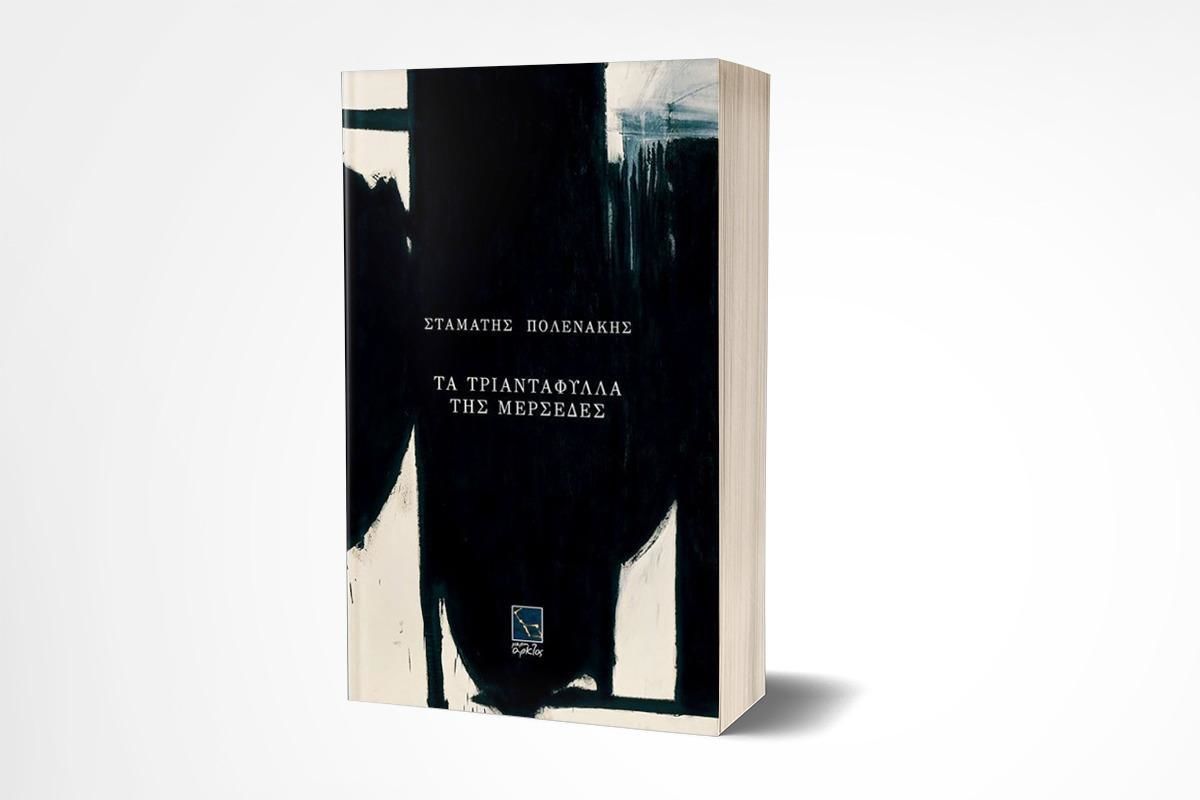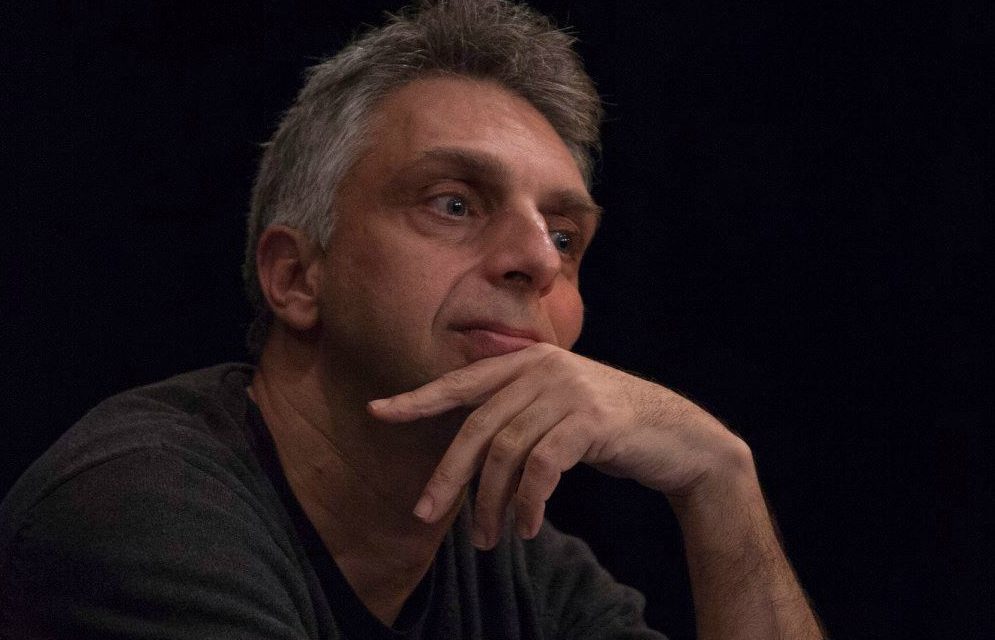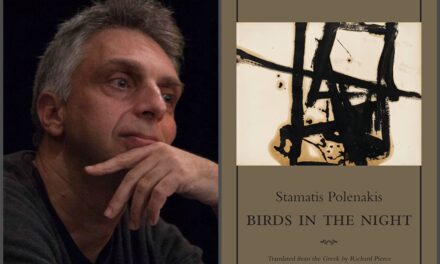Stamatis Polenakis was born in Athens in 1970. He studied cinematography in Athens, and attended Spanish literature and culture courses in Madrid (Complutense University). He has published six poetry collections: Το χέρι του χρόνου [Hand of time] (Omvros, 2002), Τα γαλάζια άλογα του Φραντς Μαρκ [The blue horses of Franz Mark] (Odos Panos, 2006), Νοτρ Νταμ [Notre-Dame] (Odos Panos, 2008), Τα σκαλοπάτια της Οδησσού [Οdessa steps] (Mikri Arktos, 2012), H ένδοξη πέτρα [The glorious stone] (Mikri Arktos, 2014), Τα τριαντάφυλλα της Μερσέδες [The roses of Mercedes] (Mikri Arktos, 2016).
His poems have been translated in English, French, German, Spanish, Italian and Catalan. His monologue Emily Dickinson’s Last Dream was translated in Romanian and was broadcast by the Romanian Radio. For his latest poetry collection The roses of Mercedes he received the ‘Anagnostis’ Award for Poetry in 2016 and the National Poetry Award in 2017.
Stamatis Polenakis spoke to Reading Greece* about The roses of Mercedes noting that “the book comprises two extensive narrative poems united by a single thread: the passions of man in the tremendous throes of History”. He comments that his poetry keeps coming back to the same themes, that is “the idea of revolution, both continuous and glorious in its failure, the effort of man to become what he is, to break his ties with the historic time and enter the messianic one, man’s unremitting effort to ennoble the world, love, memory, search for happiness, disaster and loss”.
Asked about the relationship of poetry with the world it inhabits, he expresses his uncertainty about whether “poetry can, even remotely, save the world from destruction”, and concludes that “despite the respective attempts, contemporary Greek poetry hasn’t yet managed to interweave with the global state of affairs”, although “there are ventures under way, a kind of restlessness, a kind of movement”.
Your latest poetry collection The roses of Mercedes received the National Poetry Award in 2017. Tell us about the book.
The book comprises two extensive narrative poems united by a single thread: the passions of man in the tremendous throes of History. The first poem is an almost delusional narration of a veteran volunteer, perhaps a survivor of the American Lincoln Brigade who fought in Spain during the civil war on the side of the Democrats. The second poem, through a cinematic narration, refers to the fateful August of 1914, when a gunshot in Sarajevo triggered once more the sinister forces of History and disaster.

From Hand of time in 2002 to The roses of Mercedes in 2016 what has changed and what has remained the same in your poetry?
Everything has changed and at the same time everything remains still and immobile. I am not the same person I once was. 2002 seems an eternity away. The years are lost and will never come back. Lost time cannot be regained. However, the past, the present and the future are all the very same. Time is a unity. Whatever happened once may easily happen again, Primo Levi once said. We must be extremely careful and always on the alert. Our era bears monsters as did all previous eras.
To use Dinos Siotis’ words, “Stamatis Polenakis belongs to the tradition of poets whose every poem is a revelation, an apologia of poetry made anew, a fresh acknowledgement of authentic visions and melancholic convergences, instant flashes which last for ever”. Which are the main themes your poetry delves into?
I keep coming back to the same themes. It’s probably too late now to part with my obsessions. The idea of revolution, both continuous and glorious in its failure, the effort of man to become what he is, to break his ties with the historic time and enter the messianic one. Man’s unremitting effort to ennoble the world. Love, memory, search for happiness, disaster and loss. Art and poetry as a distant memory of paradise lost.
In his review of The roses of Mercedes, Giorgos Lillis notes that you “use the technical means of a theatrical play in order to create more tension in your texts”. Where do poetry and theater meet in your work? What is their binding thread?
I reckon that all arts should be linked through an invisible thread. I really love the theatre and even more the cinema I grew up with; movies made by major, unique film-makers, such as Visconti, Antonioni, Tarkovski, Bergman. This great cinema that I fear is no longer to be created, has somewhat influenced my writing.

Vassilis Lambropoulos comments that “the Greek Generation of the 2000s has been composing a poetry of the melancholic history of intermittent insurgency, a revolt which functions irregularly as it starts, stops, and starts again”, naming your elegy “Ποίηση 2048” [Poetry 2048] (Τhe Steps of Odessa) as a case in point. What is the relationship of poetry to the world it inhabits? What can it mean for poetry to be political, or apolitical, in times of social and economic crisis?
I am not at all sure that poetry can, even remotely, save the world from destruction. However, even this downfall of man that seems so imminent, is not an inescapable reality. Man is not something that must be overcome, as was once supported. Man is something we should attain. Poetry, with its magical though minimal powers, can do nothing less but contribute to this struggle for the liberation of Man. God does not exist. Yet.
It has been argued that the new generation of Greek writers is multicultural, multiethnic and multigenerational. How do they relate to world literature? How does the local/national interweave with the global?
I am afraid that despite the respective attempts, contemporary Greek poetry hasn’t yet managed to interweave with the global state of affairs. There are of course ventures underway, a kind of restlessness, a kind of movement. An anguish that we don’t know yet where it may lead. And there is also the stance of the Greek state, which is traditionally indifferent or, at best, doesn’t know how to make use of all this artistic potential that seeks to break free.
*Interview by Athina Rossoglou
TAGS: LITERATURE & BOOKS | READING GREECE














